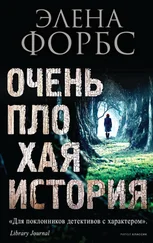‘No, it can’t. Keep watching.’
They weren’t out of the wood yet because now Reynolds was faced with a fresh manoeuvre which promised to be at least as tricky as the one.’ he had just completed. The upper track was still moving forward over the smooth slope so Barnes decided that they’d better get on with it before that track started to climb again. And they had passed the boulder now. He gave instructions and then waited, watching intently without saying another word to Reynolds. Again, it was strictly the driver’s baby.
To move back down to river level Reynolds had to brake the right-hand track, keeping the upper track churning so that it revolved the tank on its own axis to face down the bank at an oblique angle. Here again there was ample opportunity for a fatal mistake: it was not only a topple that Reynolds feared, he was frightened that the revolutions of the upper track might cause a side-slip. He paused to wipe his clammy hands on his trousers and then firmly gripped the steering levers, knowing that Barnes was relying on him to pull it off. The upper track speeded up and they began to turn. Reynolds handled the manoeuvre largely by feel, handled it magnificently, although in his own estimation he lost a few marks when Bert slithered the last yard or two and flopped into the water with a thunderous splash, but he redeemed himself in his own eyes by missing the far bank as he completed the second turn. The tank now faced downstream again. Barnes spoke quickly.
‘Well done. Now, drive like hell…’
Reynolds accelerated, the tracks churned up the water into a cauldron as the tank surged forward, pushing the river out of its way, heading non-stop for the bend which was now so close. South Pole or bust, he told himself, and increased speed more still. He could see part of the way round the bend now, could see that it turned gradually so there was no need to slow down. Instead, he speeded up! In the turret two pairs of eyes stared back at the distant bridge which was still deserted, the stone intensely white in the sunlight. Barnes turned to see how close they were to the bend, shouted a warning to Penn, and two heads ducked down inside the turret. They heard the crack of the overhanging branch as it broke against the metal. When Barnes lifted his head Penn was already standing upright as he observed the bridge, his knuckles white with tension as he gripped the turret. They felt the tank veering under them as it entered the bend, saw the bank on their right gradually screening the bridge from view until it vanished together. Ahead, Barnes saw another long stretch of river still hidden under the tunnel of trees. They had made it.
Less than half an hour later, as though their shattered nerves had not already been tested almost beyond endurance, a new crisis burst upon them. German tanks were approaching from downstream.
They had halted Bert a hundred yards or so beyond the bend, had climbed the southern bank to catch their first sight of the advancing column they had so narrowly escaped, arriving at the top in time to see the first motor-cycle patrol reach the bridge. Because of the bend in the river they could see clearly across open fields to the bridge and Penn gulped as he peered through the trees: the cycle had stopped in the very centre of the bridge while a soldier dismounted from the sidecar, and even at that distance Perm felt quite sure that the sentry was staring clear down the stretch of river they had just negotiated.
‘God!’ Penn gasped. ‘That was closer than the shave I didn’t get this morning.’
‘Which reminds me,’ Barnes replied, ‘we’ll have to clean up as soon as we get the chance.’
He focused his glasses and the bridge came up to him – the sentry walking to the northern side, gazing down over the parapet, making his way down through the brambles to check under the bridge before the column arrived. Yes, it had been damned close. He swivelled the glasses and the twin circles ran along the column – stubby armoured cars, squat self-propelled guns, heavy tanks with their deadly barrels pointed up the road. The lot, in fact. He began counting, recording the count cryptically in his notebook, a form of shorthand which only he could decipher, adding it to the notes he had already made under the bridge when he had recorded the composition of the previous column while he waited to wake up Pierre for his test watch.
Behind them Reynolds had stayed with the tank which was now resting in mid-stream like a strange steel island, the sunlight forming a patchwork of shadow across the hull where it penetrated the overhead foliage, foliage which was still dense enough to mask them from any spying plane which might fly over. The river was shallower at this point so the water flowed past no more than three feet up the sides of the vehicle, but it was also much wider and there was now a good three foot of clearance on either side. For Reynolds, who was seizing the opportunity for a little maintenance, it was more like scrambling about on the deck of a boat. Since he was over twelve feet down below the level of the banks he didn’t hear the menacing rumble of the Panzers, a sound like the distant chunter of a concrete-mixer.
Under the trees Barnes made a further note while Penn stood with his arms folded as he asked his question.
‘What happened to the bodies when they went in? I was too busy trying to observe the bridge at the time, you may remember.’
‘They both sank – they’ve probably floated miles downstream by now.’
He finished his note and frowned. The throb of powerful engines and the clattery grind of tank tracks drifted across the field as a muddled purr, but his acute hearing had detected a different sound. No, the same sound, but from a different direction. As he turned his head Penn noticed the movement.
‘What’s up?’
‘Quiet.’ He looked across the fields to his right. About half a mile away the ground sloped up gently to a low ridge so that the area beyond was hidden from view. Was there another road beyond that ridge? The sound of approaching engines was more distinct now, distinct enough for Penn to hear them.
‘Not another lot?’ He groaned in mock despair, but his feelings of despair were real enough, and he hadn’t yet recovered from his ordeal on the bridge during the night, to say nothing of that mind-breaking experience when Barnes had taken the tank up the bank and past the boulder. It was not yet 6 am and Penn’s morale was at its lowest in the early hours, on top of which he was unshaven, unwashed, and unfed. There had been no time even to have a drink of water since they had left the bridge and now he was hungry and thirsty and his stomach was full of wind.
‘I’d better take a look,’ said Barnes eventually. ‘You stay here and keep on counting – start with that tank just coming up to the bridge now.’
‘If it’s Panzers coming up the river, they’re bound to spot us.’
‘Just wait here.’
Barnes was away for fifteen minutes, although to Penn it was more like an hour, and since he had loaned his watch to Barnes there was no way of checking the passage of time. Glumly, he went on with his counting, half bis mind on making notes while the other half listened to the distant throb of engines downstream. We’re caught in a pincer movement, he was thinking, trapped between two columns of the bastards. It was bound to happen, our luck’s run out… He turned as he heard a trampling of undergrowth and Barnes came up the bank behind him.
‘It’s Panzers, all right. About a hundred yards farther on there’s another bend with a bridge just round the corner. It carries a road behind that ridge and there’s another column going over the bridge – probably to protect the flank of this lot.’
‘We’re the meat in the sandwich.’
Читать дальше
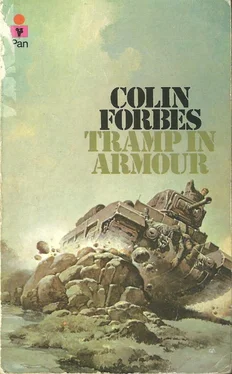

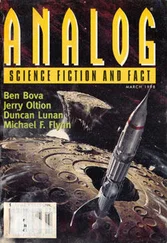

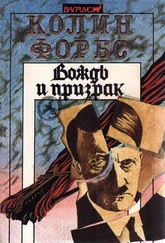
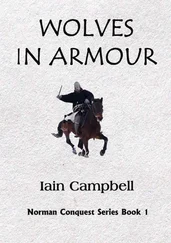
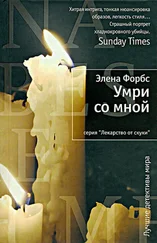
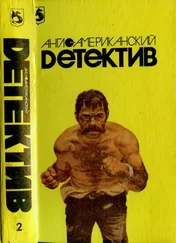
![Невилл Форбс - История Балкан [Болгария, Сербия, Греция, Румыния, Турция от становления государства до Первой мировой войны] [litres]](/books/390301/nevill-forbs-istoriya-balkan-bolgariya-serbiya-gre-thumb.webp)

